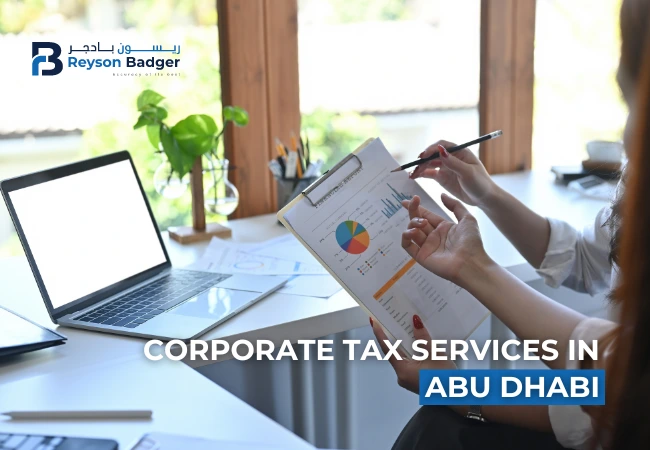
The ever-changing world of corporate tax in Abu Dhabi and the rest of the UAE makes it tricky and full of time consumption when following corporate tax legislation. Corporate tax, or taxation of the company's profits, is a very important constituent of the economic structure in the UAE. In Abu Dhabi, for example, businesses should cover federal and local tax requirements to ensure their observance of all legal duties. More importantly, however, following these regulations is also primarily not to avoid some sort of penalty but to maintain business reputation and operational integrity.
Corporate Tax services in Abu Dhabi advise companies on how to operate efficiently within the constraints of such legislation. Professional practices will allow a company to ensure the accuracy of tax reporting, optimize tax strategies, and timely adjust to the latest changes in the law. This allows businesses to manage their tax liabilities more effectively, avoid costly mistakes, and ultimately focus on their core business operations, thereby contributing to overall business success.

Corporate Tax Services in Abu Dhabi are professional financial and advisory services that help businesses in their compliance with the UAE Corporate Tax Law and follow through with registration, tax return preparation and filing, amongst other aspects of its regulations by the Federal Tax Authority.
Below is the Abu Dhabi, United Arab Emirates corporate tax rate, assessed based on the following structure:
Also, a different tax rate is applied to big multinational corporations if certain criteria are met.
The UAE introduced a federal corporate tax law effective for all businesses in Abu Dhabi, effective June 2023. The default rate is 9% on the taxable income earned that exceeds AED 375,000 while applying a 0% tax rate on those that are up to AED 375,000. Large multinationals that meet certain criteria will have a different tax rate applied. The businesses in Abu Dhabi are to be registered under FTA and allocated a TRN. Businesses are supposed to maintain adequate books of accounts and ancillary records, file an annual corporate tax return within 9 months from the end of the financial year, and pay the tax-related liability within the designated time to avoid penalty and interest charges. A quarterly advance payment is payable for those with an annual taxable income of over AED 10 million.
Other requirements include compliance with the transfer pricing, preparation of the transfer pricing documentation, and filing of the transfer pricing annual report. Penalties for non-compliance come as late registration fees pegged at AED 20,000-50,000; late filing of tax return fees pegged at AED 1,000-25,000; and late payment of tax penalty, pegged at 1-4% of the unpaid tax amount, per month. Businesses should refer to the FTA website or a tax professional for the most current information because requirements and deadlines are subject to change.
Below are Reyson Badger’s Corporate Tax Services in Abu Dhabi.
We can assist your business in getting registered with FTA and obtaining the Tax Registration Number. Our team members make the process of registration smooth and easy by advising on what documents and information are required. This service keeps your business compliant with the UAE's tax laws and regulations and avoids potential penalties.
Our experts at our company will prepare and file your corporate tax return annually to the highest standard, in good time, review the financial statement, calculate the tax liability, and submit the return electronically. Minimum chances of error or delay and meeting FTA requirements of compliance are guaranteed through this service.
Audits: We offer support on audits, ensuring that your books are in order and that you may be able to minimize penalties. Our professionals will review the audit notification for sufficiency, prepare and obtain the required documentation, and represent your company during the audit. We resolve issues promptly and amicably.
Corporate Tax Assessment
Our team will assess and address the tax assessment or notices from FTA. We ensure that you understand the assessment and work towards eliminating disputes or issues. Our objective is to minimize additional taxes, penalties, or interest.
We offer special tax services to the companies operating within the free zones, with due consideration to special regulations and benefits. Our experts fully understand the special needs and opportunities created by free zones and work to ensure that your business receives maximum benefits while remaining in compliance.
Our accounting experts will make sure the records are accurate and meet the required standards of the UAE tax laws and regulations. We offer bookkeeping, financial statement preparation, and tax accounting services that ensure your business has valid books for preparing your tax filings and ensuring the requirements of audits.
1. Create an Account: Create an account on the Federal Tax Authority (FTA) portal.
2. Submit Registration Application: Submit the registration application, providing required documents and information.
3. Pay Registration Fees: Pay the registration fees, if applicable.
4. Obtain Tax Registration Number (TRN): Obtain a Tax Registration Number (TRN) upon successful registration.
5. Submit Tax Returns: Submit tax returns and pay corporate tax on a regular basis, as required by the FTA.
6. Maintain Records: Maintain accurate and complete records of business transactions and tax-related documents.
Entities engaged in certain activities, such as:
Other than that, Abu Dhabi has introduced exemptions for:
Exemptions may be subject to specific conditions, requirements, or regulations, and may be reviewed or updated by the Abu Dhabi government.
Exclusions from Taxable Income:
Allowable Deductions:
Benefits: Free zone businesses can benefit from tax exemptions, reduced tax rates, and simplified regulatory procedures.
Challenges: Free zone businesses must comply with complex tax regulations and may face restrictions on their business activities.
Through our corporate tax services in Abu Dhabi, your company will have the following advantages:
We provide corporate tax services in Abu Dhabi at Reyson Badger, backed by a group of qualified and certified professional tax experts. We command the breadth of knowledge encompassed by local and international practices related to taxation. This entails keeping your business perfectly compliant with rapidly changing tax legislation. We have helped several clients minimize tax liabilities and avoid potential risks with our already successful track record in managing corporate tax matters. What makes the difference is attention: it takes time for us to delve into the peculiarities of your business and find the right approach to your tax problems. Whether you need help with complex current tax issues or long-term planning, Reyson Badger's professionals and outstanding service will make sure your business receives the best possible help.
1. Is there a Corporation Tax Service in Abu Dhabi?
Yes, Abu Dhabi, like the rest of the UAE, has introduced a federal Corporate Tax applicable to businesses. Effective from June 1, 2023, the corporate tax rate is 9% on taxable income exceeding AED 375,000. However, qualifying free zone entities may benefit from preferential tax treatment if they meet specific conditions.
2. What is the service tax in Abu Dhabi?
The UAE does not levy a service tax as traditionally defined in some other countries. Instead, businesses offering goods and services in Abu Dhabi are required to comply with Value Added Tax (VAT), which is charged at a standard rate of 5% on taxable supplies, except for exempt or zero-rated items.
3. Who will pay corporate tax in the UAE?
The Corporate Tax Services in Abu Dhabi applies to:
4. How to file Corporate Tax Services in UAE?
To file corporate tax in the UAE:
Businesses are advised to consult a professional tax advisor for compliance and filing assistance.